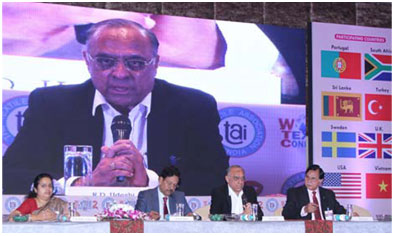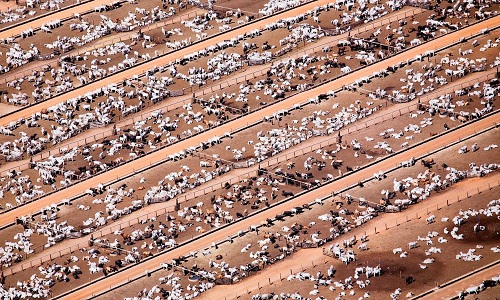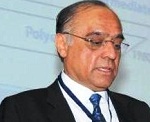FW
India is second only to China in textiles and apparel industry. But most of the textiles produced in the country is channeled towards garmenting and only 10 per cent is for other applications including home textile. To boost the industry further, India has to improve applications of different fibers. In an exclusive interview, R D Udeshi, President, Polyester Value Chain, Reliance Industries, speaks to Fashionatingworld about the issues confronting the textile sector today and what is the way ahead.
Do you think India’s textile production targets are feasible?
The total textile production is $110 billion. The government’s target is to touch $650 billion by 2025. However, 10 years is too long a period. Let’s look at a realistic target. We don’t know what will happen in 10 years. Maybe it’s better to aim for $300 billion in five or seven years. Out of this, domestic should be $200 to $210 billion and exports $100 or $110 billion. To achieve this target, we should spend on R&D, develop product application centers, create skill development programs, build new design institutes which will provide innovative fabrics, improve automation, improve the weaving capacity, have better technology looms, improve processing capabilities, have a center of excellence for knowledge sharing. The industry should think big and create an efficient cost structure.

Exporters should participate in trade fairs, have buyer seller meets. We need a fiber neutrality policy. Textile parks should be encouraged. Buyers should have all products under one roof. Infrastructure facilities should be created. Finance should be made available at international interest cost.
What are the thrust areas?
In India, 90 per cent textiles are for garmenting and 10 per cent for other applications including home textiles. Globally, it is divided half and half, 50 per cent for apparels and 50 per cent home textiles. Since India has to reach this level overall fabric production is likely to be better than what it is today. India has to improve applications of different fibers. This includes geo textiles, currency note applications, wallpaper applications. Once this happens there, will be a spurt in fiber consumption, non woven applications, non apparel applications.
Our per capita consumption is very low. So there is scope. The lower income group is entering the middle income. The median age is 26, purchasing power is improving. Clothing needs have grown. This incremental consumption will drive the domestic market. India’s annual fabric imports are almost $850 million assuming they are under invoiced. The real value is about two to three times more. So that’s a huge number. That comes to $2.5 billion. Cheap imports of fabrics should be prevented. Also fabrics are cleared at lower customs duties. This should be stopped. In India manmade fiber has always been treated as a rich man’s fiber and cotton a poor man’s fiber. Manmade fiber is seen as a revenue earner.
Is China a formidable competitor?
India used to compete with China. Now India is competing with Sri Lanka, China, Bangladesh, Vietnam. China is the biggest competitor. But labor cost in China is three times that of India’s and power cost is ten cents a unit in China. So, India is competitive in power and labor. The market is evolved. India has skills, a strong legal structure, financial capability, technical expertise, raw materials like cotton and manmade fiber.
China imported a lot of cotton yarn because they created a floor price for raw cotton. Raw cotton was more expensive than cotton yarn. That gave opportunities to Indian manufacturers and the spinning industry to export cotton yarn. They thought there was a big market. For the Chinese, it was a make or buy decision. Buy was cheaper than make. But then the floor price was removed. In future, I don’t think they will buy as they Chinese have enough spinning capacity. If they get cotton at international prices, without an artificial floor price, they would be quite efficient at production. Cotton prices in India are lower than international cotton prices. I feel that with the new cost structure in China, India has the chance to take a big portion of Chinese exports. People don’t see much stability in Vietnam or Bangladesh. We have a language advantage. But we should meet quality standards, meet the supply chain capability.
Will GST streamline procedures?
Once GST comes in, all fibers may be treated equally. The duty will be the same, whether cotton, viscose or filament based. Customers can select the appropriate fiber. GST will place fabrics on an equal footing. There is no bias in terms of duty. We have excise on polyester raw material and on polyester. We have exemption on spun yarn and on fabric. So the chain is broken. With GST, exemptions will be withdrawn. So you keep paying tax on the value you add.
What significant changes will FDI bring in?
I think 100 percent FDI will also help. It’s not so much about money. Someone will bring in innovative fabrics, marketing expertise. Once you have a financial commitment through FDI, the rest of the things will follow. In India most of us sell products through a trader. I don’t think we understand the market. Once you interact with the customer you know about design and pattern changes. So the production cycle changes based on that. Today everything is based on hearsay. India should first become a manufacturing hub of a commodity product. The next stage is to improve through innovation. The third stage is to brand your product. The fourth step is to go global.
"The key areas of growth in the first half of 2016 was: the higher value areas of the market performed well with high and industrial speed segments seeing output growth of above 35 per cent, as Indian dyers looked to continue investing in new equipment. Non-textile companies also saw the long-term potential of the industry and were willing to invest. Not only has growth in output been high, the increase in physical machinery sales in this higher value end of the market has also been impressive with 52 new models installed in the first half.
In general, India remains a high potential market for digital textile printing with both a large traditional textile market and a rapidly growing economy where investors are looking to drive growth. Increased competition is expected to put pressure on Indian printers and 2017 is expected to be a period of consolidation with growth slowing down to 20 per cent as the market adjusts to its new capabilities."

India’s digital textile printing segment has maintained its double digit growth trajectory through 2015 and 2016. However, growth is expected to slowdown next year consolidation happening in the markets, predicts a WTiN Intelligence study
Following a successful 2015, the first six months of 2016 have also been extremely positive for the Indian digital textile market. High growth across all areas and steady machinery sales, have helped boost output capacity to 54.1million sq. mt. of fabric. This 34 per cent rise for the first half of 2016 is similar to the figures seen in 2015, thanks to continued machinery investment across the sector as the textile industry continues to develop and the economy remains strong.
The key areas of growth in the first half of 2016 was: the higher value areas of the market performed well with high and industrial speed segments seeing output growth of above 35 per cent, as Indian dyers looked to continue investing in new equipment. Non-textile companies also saw the long-term potential of the industry and were willing to invest. Not only has growth in output been high, the increase in physical machinery sales in this higher value end of the market has also been impressive with 52 new models installed in the first half. Most of these higher-end models were from Italy-based manufacturers who are competing fiercely both with pricing and servicing to establish a stronger position in the Indian market. However, we have also seen Chinese manufacturers gaining ground. For Chinese companies offering high-end machinery, India is the primary export market where they have recently performed as well as their European counterparts.

This has also been supported by wider activity lower down the value chain. Looking specifically at the low speed segment, India’s large business base and growing middle class, who are increasingly setting up small businesses and providing a growing customer base, allows entry level digital textile printing to continue to grow in India. Over the last six months, 84 new dedicated textile models operating at lower speeds were sold, allowing the large part of the Indian market to grow by 31 per cent. While the numbers look smaller than in 2015, the price point of such machines is slowly creeping up. In 2015, the majority of models sold were between $10,000 and $25,000 but so far this year, while this price band is still popular, we are seeing more entry level activity at $35,000 and up. Similar to 2015, while Epson DX5 heads remain popular thanks in part to domestic and Chinese company sales, we have seen an increase of 45 per cent in output for machines using less common print heads such as Panasonic.
Looking at the positive activity seen so far in 2016 and the forecasted sales in the second half of the year, our early prediction of 28 per cent growth for the full year looks accurate. However, with a slightly better performance in the industrial segment, we are raising our forecast to 30 per cent for 2016. We still expect a gradual slowdown in growth due to the size of Indian market. Also, certain companies will now be only looking to buy when their traditional rotary machines reach their end of life. This is true for industrial speed machinery. Therefore, in future, sales in high speed segment remains important with a further 20 machines expected to be sold in the second half in this high-value area.
In general, India remains a high potential market for digital textile printing with both a large traditional textile market and a rapidly growing economy where investors are looking to drive growth. Increased competition is expected to put pressure on Indian printers and 2017 is expected to be a period of consolidation with growth slowing down to 20 per cent as the market adjusts to its new capabilities. We expect to see one or possibly two new industrial machines during this year helping to boost high speed production but with high and low speed segments still dominating physical sales.
"A new research on fashion trends and textile waste, named ‘‘Timeout for Fast Fashion’ was released by Greenpeace on the eve of Black Friday. The report highlights the serious environmental consequences of over-consumption. Clothing is among the most sold products on the annual shopping day promoted in many countries. This, critics say, encourages impulsive overspending and unnecessary purchases through ‘bargain’ offers and discount prices. "

A new research on fashion trends and textile waste, named ‘‘Timeout for Fast Fashion’ was released by Greenpeace on the eve of Black Friday. The report highlights the serious environmental consequences of over-consumption. Clothing is among the most sold products on the annual shopping day promoted in many countries. This, critics say, encourages impulsive overspending and unnecessary purchases through ‘bargain’ offers and discount prices.
Fashion the biggest polluter

Deliberating on the topic, Kirsten Brodde, Head, Greenpeace’s ‘Detox my Fashion’ campaign said that it was difficult to resist the allure of a good bargain but fast fashion means that people are consuming and trashing fashion at a higher rate than our planet can handle. To counter excessive consumerism, growing numbers of people choose to abstain and observe ‘Buy Nothing Day’ instead.
As a part of this movement, trash queens in dresses recycled from discarded clothes are being sold at shopping centres in three major cities in Asia and Europe. The main reason for this initiative is to remind customers how many impulse buys of today end up as trash tomorrow. As of today, recycling is not a solution. Markets are overloaded with unwanted clothes [2] and technological challenges mean full recycling of clothing into new fibres is still far from commercially viable. Brodde points out their research indicates the second hand clothing system is on the brink of collapse. Fashion brands need to urgently re-think the throwaway business model and produce clothing that’s durable, repairable and fit for re-use. As consumers, one also hold the power. Before buying the next bargain item, one can all ask ‘do I really need this?’.
The research, published by Greenpeace Germany, shows how the fast fashion business is rapidly expanding; clothing production has doubled from 2000 to 2014 with sales rising from $1 trillion in 2002 to $1.8 trillion in 2015 and a forecast of $2.1 trillion by 2025. The average person buys 60 per cent more items of clothing every year and keeps them for about half as long as 15 years ago, producing immense volumes of textile waste.
Environmental impacts that have been detailed in the report include chemicals from textile factories polluting rivers and oceans, high levels of energy use and pesticides from cotton growing contaminating agricultural land. One of fast fashion’s biggest costs to the planet comes from the rising use of synthetic fibres, particularly polyester that emits nearly three times more CO2 in its lifecycle than cotton, according to Greenpeace. Already present in 60 per cent of clothing, polyester can take decades to degrade, as well as polluting marine environments with plastic micro fibres.
Since 2011, Greenpeace’s Detox campaign has gathered support from 78 companies including fashion brands, retailers and textiles suppliers to achieve zero discharges of hazardous chemicals in the manufacturing supply chain by 2020 and many are making progress towards this goal. However, if the trend for more and cheaper clothing continues, any gains that are made on eliminating hazardous chemicals will be outstripped by higher rates of production and consumption in the industry as a whole.
Most WTO members want an outcome of domestic support for cotton to be a priority for the Buenos Aires Ministerial conference in December 2017, the chair of the agricultural negotiations, Vangelis Vitalis, Ambassador of New Zealand reported during WTO’s latest consultations on cotton. Welcoming recent submissions and intense debates among members, Vitalis confirmed that none of the new submissions enjoyed a consensus so far.
The Nairobi Ministerial Conference in December 2015 marked an important step to arrive at a negotiated global solution for cotton, the Cotton-4 group of countries said at the meeting. However, as noted at the last dedicated discussion in July, they regretted the lack of progress so far particularly on issues where no binding commitments were made in the Nairobi conference. Vitalis reiterated that for the overwhelming majority of WTO members, an outcome on domestic subsidies for farmers at the 11th Ministerial Conference in December 2017 should include a decision on cotton. The consultations on cotton included the sixth dedicated discussion of trade-related developments for cotton and the 26th session of the DG’s Consultative Framework Mechanism on Cotton.
The importance of achieving an outcome on cotton at MC11 was also emphasized by ministers at a meeting in Oslo, Norway, on October 21 and 22 and at a meeting of the Cotton-4 ministers on 26-28 of the same month in Bamako, Mali. The Cotton-4 said that the Bamako Ministerial Declaration made an urgent appeal for the elimination of all forms of export subsidies and domestic support for the production and marketing of cotton before MC11.
VF Corporation does responsible supply chain management. As one of the pioneers of outsourced manufacturing, VF has policies designed to stamp out underage working, forced labor and similar abuses in supplier factories. VF takes a hands-on approach throughout the product cycle, from procuring the raw materials right through to providing customer service. Its effort at collecting data on key performance indicators is mostly geared toward internal improvements.
The corporation, based in the US, has two dozen or so major brands (including icons such as Wrangler, Lee, The North Face and Timberland), a 60,000-plus staff and nearly 1000 contract factories producing over 1.3 million items a day across almost 50 countries.
The sourcing program has four main focus areas: worker well-being, sustainable living environments, environmental sustainability and product stewardship. Environmental sustainability encompasses a wide range of activities to make supplier factories more water and energy efficient. Product stewardship is a program to promote safe chemistries as well as to trace raw materials such as cotton, leather and rubber back to their original source. The sustainable operations unit has 36 personnel in 13 countries. It advises factory owners in Bangladesh on a remediation plan.
The company has also launched a stand-alone website that details its supply-related policies and practices.
Though the 2016 US cotton crop may still be somewhat of a question mark but the November numbers provided by USDA clarify a few things. One, cotton crop got smaller in some areas as expected and second, the crop still got bigger overall. The North and South Carolina cotton crops dipped by 95,000 bales. The Georgia crop is now closer to being correct after being reduced to 150,000 bales and the crop could get a bit smaller in all 3 instances. But these reductions totaling almost ¼ million bales were more than offset by increases in Mississippi, Tennessee, and Texas.
US exports are projected at 12 million bales unchanged from the October estimate. This is a good level of exports considering that China is expected to limit imports for the second consecutive year. As of November 10, export sales, this marketing year, total approximately 7.0 million 480-lb equivalent bales—58 per cent of the USDA estimate. This compares to 47 per cent at this time last year. Shipments total 2.55 million or 21 percent of the estimate. To date, the pace of shipments projects to only 9.2 million bales for the marketing year—but shipments were 17 percent at this time last year.
China is expected to import 4.5 million bales from all sources, this crop year compared to 4.41 million last year. As of 11/10, US export shipments to China totaled approximately 264,400 bales. Sales totaled approximately 910,000 bales or 20 percent of China’s expected total imports.
This month’s USDA numbers lowered world cotton use, or demand, just slightly to 111.99 million bales. In the big picture, this number itself is insignificant. But psychologically, this nervous market will pay close attention to this number. This is only .65 percent above last year and less than 2 percent growth since 2013.
Micro-finance companies, taking advantage of the demonetisation of high value currency, are slowly re-entering Sircilla textile town in AP and lending small loans to power loom weavers. Demonetisation has cast its shadow on the powerloom industry which is already reeling under crisis due to no-takers for its grey fabric.
Two micro-finance companies started providing loans ranging from Rs 2,000 to Rs 5,000 after collecting bonds and sureties. They collect a whopping interest rate of 36 per cent and burden the weavers. Usually, months of November and December are lean seasons for the movement of fabric. Demonetisation has come as a rude shock to main purchasers of the fabric - traders, powerloom owners and power loom workers. As fabric production and sales are done only through cash, the ban and restrictions on withdrawal of cash from banks has become a cause of concern for everyone involved in the industry.
People in Sircilla still remember the harassment by micro-financers who operated till 2008. There were incidents of weavers resorting to suicide unable to bear the mental agony and torture by agents of micro-finance companies.
The then chief minister of united Andhra Pradesh removed micro-finance companies by making nationalised banks provide loans to weavers.
In a bid to register their strong protest over discrimination against the Punjab textile industry over gas prices, a key input, a lot of associations of textile manufacturers in Pakistan have said they will observe December 6 as ‘Black Day’. The disparity in gas prices had shattered the entire industrial chain in Punjab, the associations say.
All trade bodies including the Pakistan Textile Exporters Association (PTEA), Faisalabad Chamber of Commerce and Industry (FCCI) and All Pakistan Textile Mills Association (APTMA) have lashed out at what they say was the government’s discrimination against the Punjab-based textile industry as it was bearing the brunt of gas shortage.
PTEA Chairman Ajmal Farooq said that industries in Sindh were consuming low-priced gas to meet their needs while Punjab industries, which generated the highest revenue, were compelled to use the expensive re-gasified liquefied natural gas (RLNG) in their production process. With the recent reduction in the industrial gas tariff, the price for Sindh industries has become Rs400 per million British thermal units (mmbtu) whereas Punjab industries are paying over Rs900 per mmbtu.
Expressing disappointment over the indifference and lack of cooperation from government institutions, Farooq said they were repeatedly voicing their concern over the situation but all of the hue and cry was falling on deaf ears of policymakers. He urged the PM to take notice and ensure gas supply to Punjab at the same price.
He also urged the PM to immediately announce a package for the ailing textile industry and warned if the government did not fulfill their demands, they would hold a massive protest.
Pakistan’s textile exports have moved down by 12.11 per cent. Despite being the largest forex earning sector this year, exports declined to $8363 billion. Although the country is reaping the benefits of GSP, it has shown bleak performance in the export sector and the Islamabad Chamber of Small Traders (ICST) has expressed deep concern and termed it unacceptable.
The decline is being attributed to the shortage of electricity and delays in disbursement of export refund claims. Despite achieving preferential market access to the European Union, exports have been declining for the last two years. The country is facing tough challenges in the international market. Many have urged the government to take over the textile industry since many textile owners are winding up businesses and moving to other countries. The government should provide safe environment for the industry to thrive and guarantee better incentives and friendly policies.
ICST has urged the government to take immediate steps to arrest the trend as rival countries are snatching Pakistan's share in the international market which will have a negative impact on the economy. The government should make plans to provide affordable energy to Punjab's value added sector which rely on the supply of LNG, says Shahid Rasheed Butt, Patron of ICST. He says Punjab's textile sector is already buying costly LNG while the value added sector in Sindh gets uninterrupted supply of natural gas throughout the year.
The Delhi High Court on Friday adjourned Monsanto's challenge to proceedings initiated against the company and its officials by the Competition Commission of India (CCI) earlier this year, as government co-counsel senior advocate, A S Chandhiok, was unavailable to present his arguments.
His absence though, did not stop either party from continuing their on-going tussle before the single judge. On hearing Chandhiok's unavailability, counsel for Monsanto, Ajit Warrier, highlighted CCI's continuing attempts at delaying proceedings and pressed for the matter to be heard nonetheless in order to avoid any coercive steps being taken against the company.
Co-counsel for the government, additional solicitor general Sanjay Jain responded to this by informing the court of Monsanto's non-cooperative attitude and failure to respond to notices on the ground that the matter was sub-judice before the court, even though no stay order was granted against the probe. After hearing the submissions, Justice Sanjeev Sachdeva agreed with Jain that the investigation was to continue as usual, while also consoling the Monsantocounsel that any coercive action could be undone if necessary, at a later stage. The court then adjourned the matter till December 7.
The CCI had in February, ordered a detailed probe into the activities of the genetically modified seed manufacturer after finding prima-facie evidence of violations of Indian competition laws. After the commencement of the initial probe, the regulator clubbed three additional complaints against Monsanto later in June. The CCI has also included Monsanto officials into the ambit of the probe, which the company contends is beyond the scope of the regulator's powers at this stage. Monsantohas challenged both the investigation and the inclusion of its officials by the CCIin the Delhi High Court.













